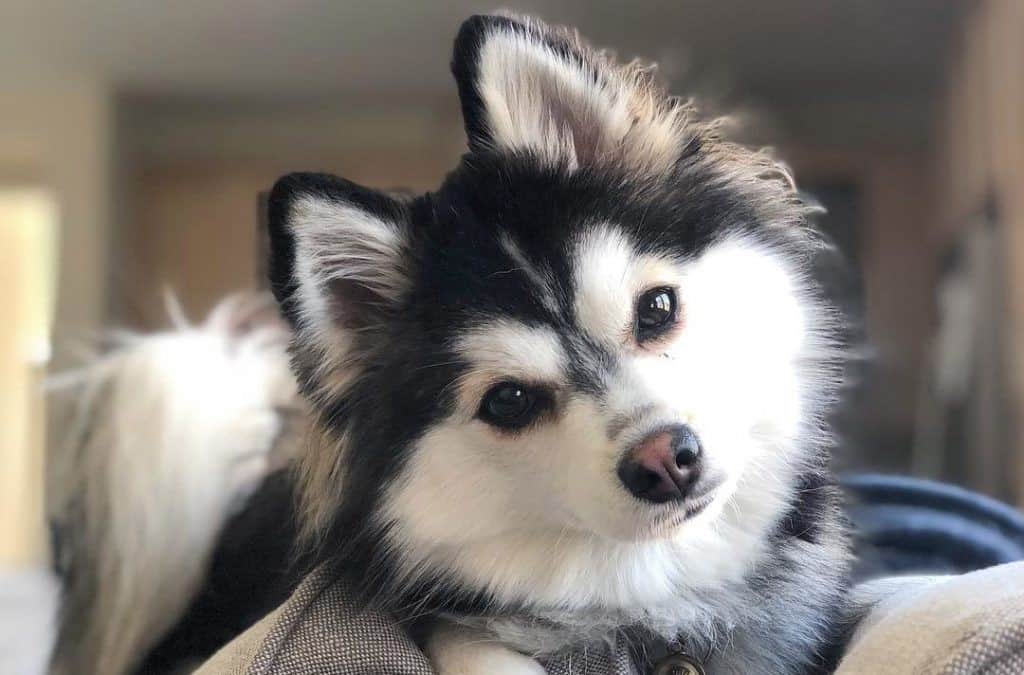
Pomskies have been taking the internet by storm in recent years. Their cute, fluffy appearance mixed with the striking features of a wolf make this breed incredibly cute and playful. If you plan on adopting one of these cuddly creatures, it’s vital to consider breed-related health issues.
According to ByersGuide, pet owners should purchase pet insurance to protect themselves from unplanned expenses. But, how frequent are these expenses likely to be with a Pomsky?
Pomsky Health Concerns
Both Huskies and Pomeranians have a long lifespan of 12-16 years, and so does its child breed, the Pomsky. Since Pomskies are a new breed, it’s difficult to account for health concerns, but we can look at their parents to determine their likelihood of inheriting specific diseases.
Typical problems the Pomeranian might pass to the Pomsky include:
- Dental problems, such as plaque build-up
- Hookworms and roundworms
- Eye and ear infections
- Skin irritation
- Collapsing trachea
The other parent, the Siberian Husky, passes on the following issues to the Pomsky:
- Hip dysplasia (or joint problems)
- Heart disease or circulatory issues
- Epilepsy
- Allergies
With these health problems in mind, let’s take a look at what you can do to prevent them.
How to Reduce Pomsky Health Issues
To prevent or reduce health issues pertaining to your Pomskies teeth, eyes, skin, throat, joints, and heart, make sure to take your pup to the vet regularly and commit to doing the following.
1. Dental Problems: Brush Their Teeth
To reduce dental problems, brush your Pomskies teeth at least once a day. If you take it slow, even senior pets will let you brush their teeth. Offer your pup safe toys and treats that help them clean their teeth, like rubbery balls, rawhide strips, and Greenies Dental Dog Chews.
2. Hookworms and Roundworms: Deworming
Have your puppy dewormed at an early age and start or keep your pets on a preventative drug program that controls or treats worms. Learn to recognize and avoid known contaminants, like sand, plants, and soil. Always keep play areas, like gardens and lawns, free of animal waste. Learn to recognize and avoid known contaminants, like sand, plants, and soil. If you have lots of plants indoors or outdoors, understand pet-safe plants.
3. Eye and Ear Infections: Cleaning
Clean your Pomskies eyes and ears using a cotton swab. Crust or goop around or in your puppy’s ears and eyes is completely normal, but if they’re scratching at the site, it could indicate a more serious problem. Be sure to clean their eyes and ears regularly to prevent infection.
4. Heart Disease, Allergies, and Hip Dysplasia: Diet and Exercise
Most of your Pomskies health issues can be solved by feeding them a healthy diet. What a diet can’t solve, exercise will. Pomskies stay medium-sized when they reach adulthood, so feed them according to their weight. Take your Pomsky out for a 60-minute run every single day.
5. Skin Irritation: Regular Grooming
Pomskies have big grooming demands, so you may want to consider a groomer to keep their bulk down. To reduce the likelihood of skin irritation, wash your Pomsky once a month. Brush your pup thoroughly, cut their nails, and trim their undercoat when they start to shed.
6. Collapsing trachea: Medications and Clean Air
It’s difficult to truly prevent a collapsed trachea, as this issue is hereditary. However, you can reduce the likelihood of your Pomsky developing this problem by keeping their weight down and having a smoke-free home. You might also want to add an air purifier for pets to be extra safe. If it does happen, medical intervention works for up to 70% of dogs.
7. Seizures: Medication and Reducing Triggers
Dogs often have “triggers” that may lead to seizures, such as stress brought on by a change in their environment. The most effective way of preventing your Pomsky from getting seizures is by minimizing triggers, feeding them a healthy diet, and keeping their blood sugar low.

